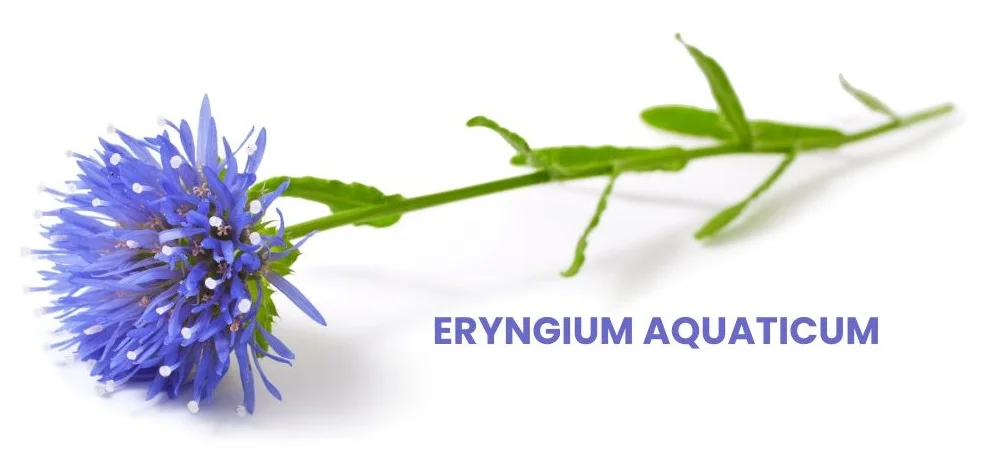Eryngium Aquaticum, commonly known as Button Snake-root, is a homeopathic remedy primarily used for urinary disorders.
It has been recognized for its action on the urinary system, exhibiting effects that align with various conditions, particularly those associated with nervous erethism and urinary irritability.
Its clinical applications extend to respiratory issues, providing a holistic approach to patient care in homeopathy.

Table of Contents
ToggleSOURCE INFORMATION
Scientific Classification
- Kingdom: Plantae
- Division: Angiosperms
- Class: Eudicots
- Order: Apiales
- Family: Apiaceae
- Genus: Eryngium
- Species: E. aquaticum
Origin
- Eryngium Aquaticum is native to wetland areas in North America, thriving in marshes, riverbanks, and floodplains.
- It is a perennial herbaceous plant known for its distinctive spiny flowers and foliage.
Historical Facts
- Traditionally used by Native American tribes for its medicinal properties, Eryngium Aquaticum has been recognized for its benefits in treating urinary conditions and respiratory ailments.
- Its historical significance extends to folk medicine where it was employed for a variety of ailments, showcasing its versatility as a remedy.
DRUG PATHOGENESIS
- Eryngium Aquaticum acts primarily on the urinary system, addressing conditions characterized by strangury, painful urination, and irritability of the bladder.
- Its effects also encompass respiratory symptoms, helping alleviate cough and throat irritation.
- The remedy is thought to stimulate diuresis and support kidney function while managing the associated discomforts of urinary tract inflammation.
PHYSICAL CONSTITUTION
Individuals who may benefit from Eryngium Aquaticum often display a sensitive physical constitution, particularly regarding the urinary and respiratory tracts. They may present with:
- Nervousness and anxiety,
- Symptoms exacerbated by stress or emotional strain,
- A tendency towards sensitivity to environmental changes.
DIATHESIS
- Eryngium Aquaticum may be indicated for patients with a neurotic diathesis, displaying signs of emotional instability alongside physical complaints.
TEMPERAMENTS
- Those with a phlegmatic temperament, often characterized by sluggishness and irritability, may find relief through this remedy, particularly when presenting with urinary complaints.
KEY CHARACTERISTICS
Urinary Symptoms
- Strangury and tenesmus (a feeling of incomplete voiding).
- Thick, yellow, mucous discharges.
- Pain behind the pubis and in the urethra.
- Frequent and difficult urination.
Respiratory Symptoms
- Cough associated with a sense of constriction.
- Smarting sensation in the throat and larynx.
- Symptoms similar to those of influenza.
Male Reproductive Health
- Discharge of prostatic fluid with minimal stimulation.
- Seminal emissions accompanied by feelings of fatigue.
DETAILED ORGAN SYMPTOMS
URINARY
- Strangury: Painful and difficult urination, often accompanied by a sensation of urgency.
- Renal Colic: Sharp, cramping pain that radiates from the kidneys down through the ureters.
- Congestion: Dull pain in the lumbar region, exacerbated by conditions that lead to urinary retention or obstruction.
RESPIRATORY
- Cough: A dry, irritating cough that feels constricting, often aggravated by environmental triggers.
- Smarting in Throat: A burning sensation in the throat, especially when breathing in dry air.
MODALITIES
Worse
- Evening time, especially in conditions that provoke sweating or urinary urgency.
- Stress and emotional upheaval.
Better
- Warmth and gentle pressure on the abdomen and lower back.
- Rest and relaxation may alleviate symptoms of anxiety and discomfort.
RELATIONSHIP WITH OTHER DRUGS
- Conium (Conium maculatum): For similar urinary complaints, especially in older patients with prostate issues.
- Cannabis (Cannabis sativa): Used for similar symptoms of irritability and discomfort.
- Dioscorea (Dioscorea villosa): For pain associated with spasmodic conditions.
- Ocimum (Basil): Known for its calming effects, particularly in nervous conditions.
- Clematis (Clematis erecta): Effective for symptoms of pain and irritation in the urinary tract.
DOSE
- The recommended dosage is typically in the form of a tincture or up to the third potency, adjusted based on individual patient responses.
Frequently Asked Questions
What conditions is Eryngium Aquaticum used to treat?
- It is primarily used for urinary disorders, including strangury, difficult urination, and irritable bladder symptoms. It also addresses some respiratory conditions.
How does Eryngium Aquaticum work?
- It acts by alleviating inflammation in the urinary tract and promoting better urinary flow while providing support for respiratory discomfort.
Can it be used alongside other medications?
- It is advisable to consult with a healthcare professional before combining Eryngium Aquaticum with other medications, particularly those affecting the urinary system.
Glossary of Difficult Words
- Strangury: A painful or ineffective urination, often with a feeling of urgency.
- Erethism: A state of heightened nervousness or irritability.
- Tenesmus: A sensation of incomplete evacuation, particularly in the bladder or rectum.
- Diuresis: Increased production of urine.
- Renal Colic: Severe pain caused by kidney stones or other obstructions in the urinary tract.
This detailed exploration of Eryngium Aquaticum provides a comprehensive overview of its therapeutic uses, symptoms, and relationships in homeopathy, making it a valuable addition to the homeopathic materia medica.
